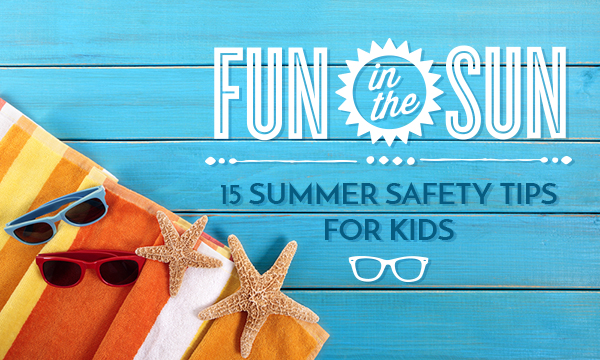
No matter how young or old you are, you need to be careful when you go out in the sun for an extended period of time. Since children tend to love the outdoors, it’s extra important that they protect themselves from ultraviolet rays. As a parent, it’s your job to remind your children to take the right steps to keep themselves safe during the summer.
It tends to be tougher to keep kids safe during the summer, but it’s by no means impossible. Send your kids on their way with the right SPF-level sunblock and enough water and remind them to take a break in the shade whenever they get the opportunity. Don’t let young children hang out by the pool area if there are no adults around, and make sure they wear the appropriate safety gear when they play sports. Keep reading and pick up some tips on keeping kids safe during the summer.
Find the Right SPF—If you love spending time at the beach, you’ve probably dealt with a sunburn or two in your life. Although they’re often mild, sunburns can be severe in some cases. That’s why you should check to make sure your sunblock is of a high enough SPF before you spend a day in the sun. SPF stands for sun protection factor and the higher the number, the stronger the protection. Ratings can range between two and 100, so know your skin type and purchase sunscreen that can adequately protect you from ultraviolet rays. Remember to reapply your sunblock if you’re going to stay out in the sun for a long time for maximum protection.
Stay Hydrated—You sweat to regulate your body temperature, but you need to replace the fluids you sweat out or you could become dehydrated. Make sure your children are drinking enough water while they play outside, especially if they’re particularly active. Have your kids drink water during their sporting events and remind them how important it is to stay hydrated during the summer. Dehydration is a serious health hazard and everyone is susceptible. Symptoms of dehydration include physical weakness, dark urine and a dry mouth. If you notice any of these symptoms in your child, have him or her drink water right away.
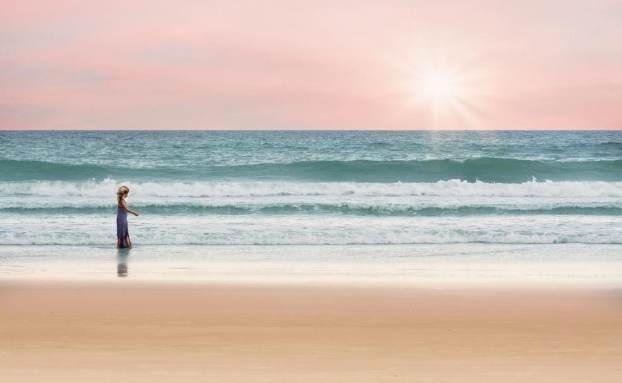
Know When to Go Out—It’s tempting to get the most out of your summer by spending as much time as possible in the sun, but certain times of the day are safer than others. The sun shines with particularly strong ultraviolet rays between 10 a.m. and 3 p.m. It’s better for your children to play outside before or after this window since the sun will be less of a threat. If your kids are going out during this time period, make sure they put on sunblock and wear a hat or glasses to protect their eyes.
Wear Light Clothing—Pay attention to what you’re wearing when you go out in the sunshine. Dark colors absorb light, while lighter colors reflect it. That’s why you’ll feel noticeably warmer in a black shirt than you will in a white one. Have your kids dress in lighter hues throughout the summer in order to minimize the heat of the sun. The more the rays are absorbed, the hotter your body will be, so it helps to wear clothing that reflects the sunlight instead of absorbing it.
Rest in the Shade—It’s safer to hang out in the shade rather than the direct sunlight. If you’re going to be outside for a while, find a shady spot to rest in when you start to heat up. It could be an awning, a canopy or a leafy tree. Anything that blocks the sunlight will reduce your chances of getting a sunburn or even heatstroke. If you and your kids are heading somewhere where you know there won’t be any shade, bring an umbrella along so you can create your own.
Pool Area Rules—It’s imperative that your children understand the importance of following the rules when they’re by the backyard pool. The pool area can be unsafe for kids, especially when they’re not supervised properly. Set strict pool rules for your children and enforce them so your kids don’t put themselves in danger.
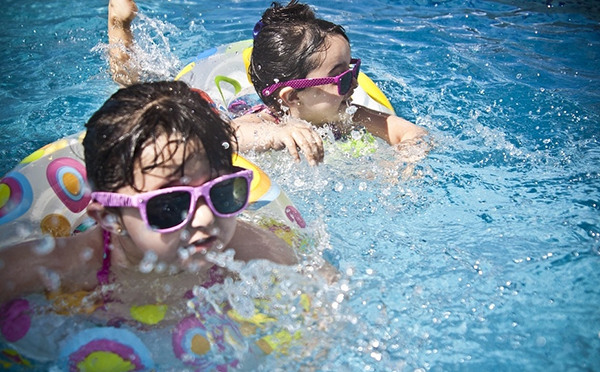
Supervision and Access—Your kids should only be allowed to hang out by the pool if an adult is present. Unsupervised swimming can be extremely dangerous, especially because children are less likely to follow the rules if they know no one is watching them. Only let young children access the pool area if you or another adult is present. This way, injuries will be less likely to happen and, if they do, you’ll be able to handle them before they become serious.
Floats—Jousting with pool noodles is a fun time, but make sure your children don’t get too carried away. If your kids are going to play with pool noodles or any other kind of float, they should be responsible. Even a seemingly harmless noodle can leave a mark, so keep an eye on your kids so the jousting doesn’t get too intense.
Sunblock—Just because you put one layer of sunblock on doesn’t mean you’re protected for the rest of the day. People sweat their sunblock off and going in the water just makes it come off faster. Remind your children to reapply their sunblock when they hang out by the pool. Find the correct SPF for your child’s skin and have him or her put more on after a couple of hours.
Running and Diving—There’s never a good reason for your kids to run around the pool area. The water that spills over the edge of the pool and onto the deck will present a slipping hazard, which can lead to real injuries. In addition, shallow pools are not meant for diving into. Unless your pool is deep enough for it to be safe, don’t let your children dive into the backyard pool.
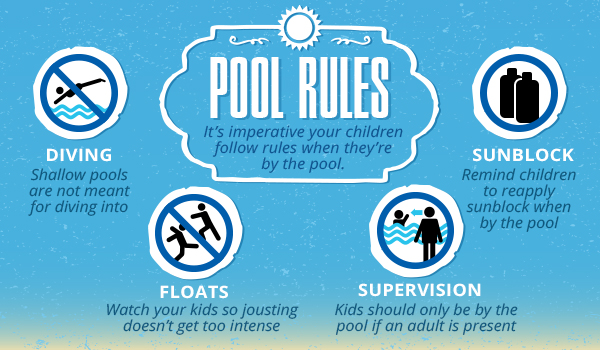
Wear Hats and Sunglasses—You have to protect your head and your eyes when you go out during the summer. The visor part of your hat helps block the sun from your eyes, as do sunglasses. Like the skin, the eyes are vulnerable to ultraviolet rays. Anything that can shield the sunlight from your children’s eyes will help keep them safe, but hats are better than visors because they cover the scalp. Sunglasses are convenient, aesthetically pleasing and great at protecting your eyes from the sunlight. Have your children put on the appropriate protective wear when they go out in the sun for an extended period of time.
Watch Out for Bugs—Insects are a real threat that many people fail to recognize, and they tend to be more active during the warmer parts of the year. It’s easy for a bug to land on you without you noticing, especially with the sunshine and sweat covering your body. Certain bugs carry diseases and can be harmful to your health, so your children should use insect repellent whenever they go out. Spiders, bees and mosquitos are all threats that could bite or sting your kids and some of them are venomous. It’s impossible to keep bugs away from you, so it’s all the more important that you have your children use insect repellent.
Use Appropriate Safety Gear—As hot as it gets during the summer, you shouldn’t forego the appropriate equipment when you play sports or ride your bike around town. If your kids are planning on playing a game of pickup football, they should wear their helmets and pads. They should also wear helmets when they go on bike rides, and they should wear reflective clothing if they’re riding at night. The appropriate safety gear can help neutralize a dangerous situation, so your children should always be well-prepared for the situation.
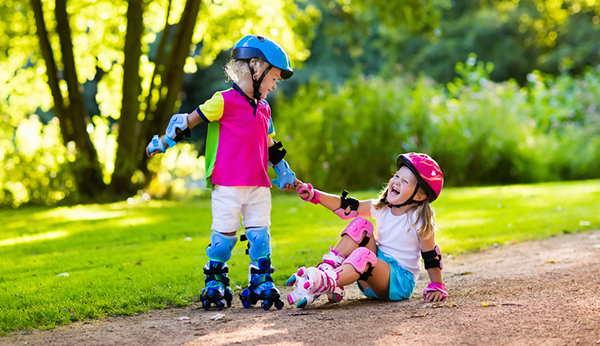
Treat Sunburn Quickly—If your child does end up with sunburn, treat it as soon as you can. Although the sunburn itself won’t get worse without more exposure to ultraviolet rays, your son or daughter will still be in pain. If your kids forget to put on or reapply their sunscreen, there are steps you can take to relieve the symptoms of sunburn. Ice packs and moisturizer can help soothe and repair the skin, and aloe can also help with the burn. You can also use nonsteroidal anti-inflammatory drugs, or NSAIDs, to reduce swelling and pain at the same time.
Understand Heat Exhaustion—The body can only take so much heat, and symptoms start to occur when the body temperature exceeds the normal 98.6°. Heat exhaustion is the middle stage between heat cramps and heatstroke. If you’ve been out in the sun for a long time and you notice your heart racing or your body sweating heavily, you might be suffering from heat exhaustion. Tell your children to take breaks from physical activity while they’re outside so they don’t develop these symptoms and make sure they drink plenty of water.
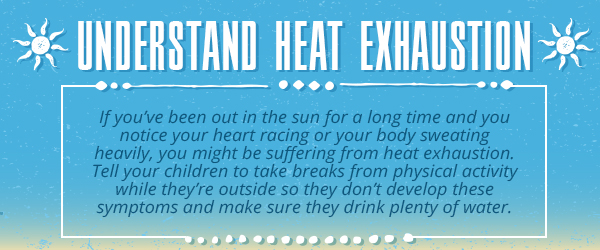
Cool Off in the Pool—Regardless of how big or small your yard is, you can probably make the space for an above ground pool. Swimming in a backyard pool is a fun and convenient way to cool off when the sun gets to be a bit too much, and people of all ages can appreciate the new installment. When your kids get home from soccer practice and want to wind down and cool off, they can go for a quick dip in the pool. The water is also good for the muscles because it limits the effects of gravity, so a swim session will feel good and heal your body.
Look Both Ways—This rule is applicable no matter what time of the year it is, but it tends to be particularly pertinent during the summer when kids are out of school and spend their time walking around the neighborhood. Your kids should understand how important it is to look both ways before they cross the street. A car accident can be a deadly tragedy, so teach your children to assess their surroundings before they cross the street.
Wear a Lifejacket—Part of the fun of summer is going out on a boat with your friends and family. If your kids are going to come along, they should wear lifejackets while they’re on the watercraft. Children might not have the strength to keep themselves afloat and get back to the boat, but lifejackets will come to the rescue. Always keep enough lifejackets on board for yourself and all of your passengers.
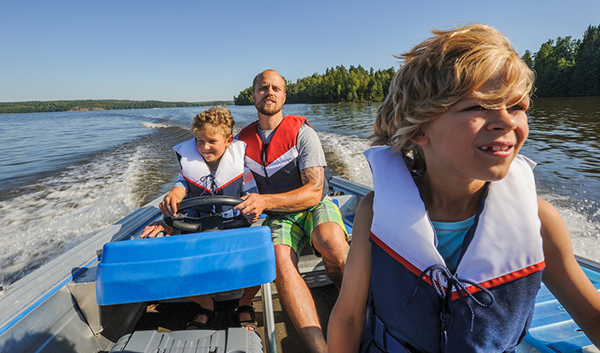
Don’t Stay in the Car—Staying in the car in the sweltering heat can be more than just uncomfortable. It can be deadly. Never leave your children in the car during the summer, especially during the hotter days. The interior of a car can easily reach more than 100° in under an hour on a hot day, so you should never leave children or pets inside your vehicle.
Summertime represents freedom and fun for children, as they’re done with their school year and they get to spend their days hanging out with their friends and enjoying their spare time. Unfortunately, spending too much time in the sun can be dangerous if you’re not careful. Taking these preventative measures will keep your kids safe and healthy during the warmer months of the year.
 Hello Guest,
Hello Guest,  158 item(s)
158 item(s)
